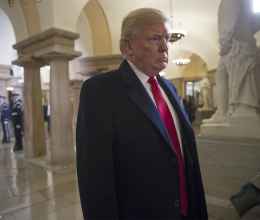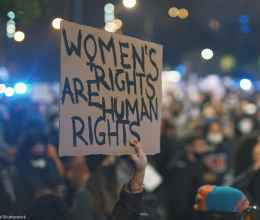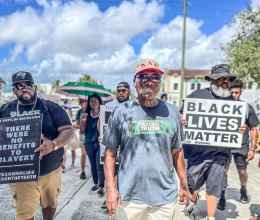
This op-ed first appeared in Slate.
Body cam footage released last week by The Tampa Bay Times and The Miami Herald depicts arrests made by local police in August of Florida residents who voted in the 2020 presidential election while allegedly ineligible. The arrests were made on orders from Gov. Ron DeSantis’ new Office of Election Crimes and Security—also known as his election police.
The footage is disturbing. It is clear that the individuals, arrested in and around Tampa, have absolutely no idea that they have done anything wrong and why they are being detained. At moments, their confusion and distress are so pronounced that the police arresting them try to console them. As The Tampa Bay Times put it, the police are “almost apologetic” for their actions.
The person who should be apologizing to them is DeSantis. It is the Florida governor and his legislative allies, in their attempts to create barriers to voting in the state, who have created a system so dysfunctional and intentionally confusing that it does not allow many thousands of Floridians to confidently know whether they are legally eligible to vote. Now some of those people are facing third-degree felony charges, with the possibility of up to five years in prison, solely for attempting to participate in the democratic process. The charges are already falling apart. But the chilling effect on countless other voters will linger.
Nineteen people were arrested around the state on that day, Aug.18, and charged with voting illegally in the 2020 general election. These arrests are the result of the legislature’s continued defiance of the will of Florida voters.
In 2018, Florida voters approved Amendment 4 by a 65 percent majority, which restored voting rights to Floridians with past felony convictions, except for murder or sexual offenses. But in 2019, DeSantis and his legislative allies passed Senate Bill 7066, undermining the will of the people. Under that law, it is not enough to complete your prison sentence and probation to regain voting rights in Florida. You must also pay legal financial obligations associated with your past felony conviction—although the state has no central database for information on convictions and the resulting financial obligations. This leaves hundreds of thousands of Floridians unable to assess if they owe money and how much. Essentially, the state created a pay-to-vote system, while giving people no way to determine how much they must pay.
With all the confusion on voting rights sown by the DeSantis administration, would-be voters have been left without meaningful official guidance. The state’s voter registration application only requires a potential voter to swear that they have not been convicted of a felony, or if they have, that their rights have been restored. The form does not mention that homicide and sexual felony convictions are disqualifying.
And sometimes individuals are given outright false information about their eligibility. One man arrested, Nathan Hart, explained to police that in March 2020 he went to the DMV to conduct other business and was encouraged by a clerk to register to vote right there. Hart has a past felony conviction and said that he probably wasn’t eligible. The footage depicts what came next.
Hart says he informed the clerk his probation ended the month before, and the clerk told him to fill out the registration form.
“If they let you vote, then you can,” Hart says he was instructed by the clerk. “If they don’t, then you can’t.”
One of the police officers arresting Hart speaks up.
“Then there’s your defense. You know what I’m saying? That sounds like a loophole to me.” But Hart, who was ineligible to vote because of his particular conviction, was still arrested.
Romona Oliver is also seen on video, clearly confused about why she was being arrested by police. She registered to vote in 2020 at the county tax collector’s office. She had never voted before.
“It was exciting for me,” she told The Miami Herald, “because I felt like, after all that time, I want to get out and try to do the right thing. Give back to the community.”
She told the newspaper that six months later she updated her address and filled out another registration form. Although the Florida Department of State is supposed to search the rolls for ineligible voters, on both occasions government officials approved her application and sent her a voter ID card. She voted in 2020, assuming she was eligible to vote. She too is facing third-degree felony charges.
Tony Patterson appears in the footage being detained outside his Tampa home. He is distraught.
“What is wrong with this state, man?” he pleads with police officers. “Why would you all let me vote if I wasn’t able to vote?”
The Tampa Bay Times quoted one of the officers who drove Patterson to jail.
“I’ve never seen these charges before in my entire life,” the officer said.
Patterson and Oliver are both Black. Out of the 19 people arrested that day, at least 13 are Black, according to the Tampa Bay Times. Critics have called DeSantis’ offensive against voting rights an attack against low-income Floridians, and Black and brown communities.
What we’re witnessing now is a campaign designed to chill Florida voters from exercising their right to vote. Instead of helping returning citizens figure out their remaining debts, the state is spending even more money to prosecute them for failing to navigate Florida’s intentionally confusing system. Returning citizens in Florida are left with two impossible choices: stay disenfranchised or risk criminal prosecution. That amounts to state-engineered voter intimidation.
When people register or vote without realizing they’re ineligible, the proper course should be to notify them of their ineligibility, not prosecute them. It is the state’s responsibility to determine the eligibility of Floridians registering to vote, and the state should devote resources for that purpose, not upend lives in order to prosecute mistakes.
The formation of the state election police and the Aug. 18 arrests, which took place in at least five different counties, are part of DeSantis’ attempt to sow doubt about the safety of our elections and intimidate certain Floridians from voting. The announcement on Aug. 18—just days before the August primary—was a calculated move that sent a clear message: If you have a felony conviction, the state wants you to think hard before voting, even if you are eligible.
Florida law is clear: There must be willful intent to commit the crime of voter fraud. It may be difficult for prosecutors to prove that any of DeSantis’s targets actually knew they weren’t allowed to vote—they appear to have had no idea. In conservative Lake County where six people with felony convictions were accused in March of having voted illegally, a supervisor in the state attorney’s office has written that they will not be prosecuted because they all appear “to have been encouraged to vote by various mailings and misinformation.”
The Aug. 18 arrests are specious on other grounds, as well. On Oct. 21, Circuit Court Judge Milton Hirsch quashed the criminal case against one of the people arrested, clarifying that the statewide prosecutor who brought the charges had no authority to do so. That’s because statewide prosecutors may only prosecute offenses that occur in two or more judicial circuits, and the defendant’s conduct occurred entirely within one circuit. State law directs statewide prosecutors to focus on “complex” or “large-scale organized criminal activity.” Accidentally casting a ballot when you’re not allowed to is “the very antithesis” of such illegality, Hirsch noted. If Hirsch’s analysis were adopted in other circuits, that would essentially be the end of statewide prosecutors’ attempted run-around of local prosecutors’ authority in this context.
In the end, the Aug. 18 arrests may turn out to be yet another political stunt by DeSantis that falls apart upon court review. In September, he planned to have 49 unsuspecting Venezuelan immigrants flown from Texas to Massachusetts, desperate people who thought they were being helped only to find out they were pawns in a political ploy. In both cases, the end product of a DeSantis stunt has been the same: more human suffering among the most vulnerable.







